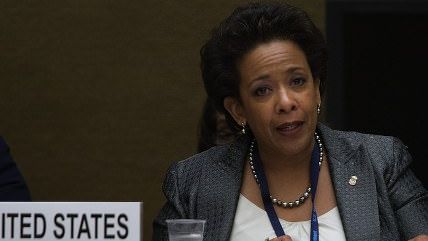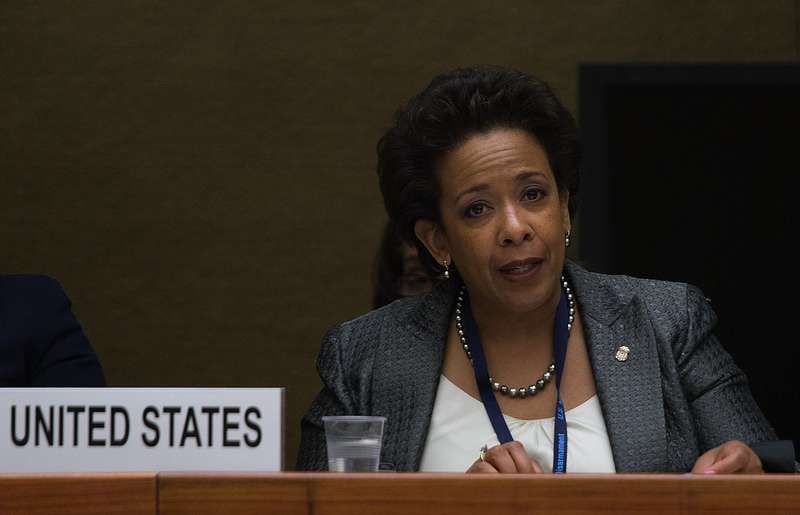How the DOJ Contributed to the Awful Ferguson Police Culture It Condemns
You know who else has a judicial system that is hard to fight and extracts money from citizens?


The Department of Justice's 100-page report on the behavior of police in Ferguson details a horror show of malign behavior from city officials devoted to dragging oftentimes poor, helpless (and black) citizenry through a complicated, inscrutable court system designed to wring them of whatever little money they possess.
While the racial politics behind Ferguson's policing garnered the bulk of media attention, as Ed Krayewski noted earlier in the week, the DOJ took aim at how the city used fines to generate revenue completely separate from any actual goals of improving public safety. And that revenue, obviously, was used to pay their own wages. They needed fines from the courts to justify the costs of the courts, of course! From the DOJ report:
Court staff are keenly aware that the City considers revenue generation to be the municipal court's primary purpose. Revenue targets for court fines and fees are created in consultation not only with Chief Jackson, but also the Court Clerk. In one April 2010 exchange with Chief Jackson entitled "2011 Budget," for example, the Finance Director sought and received confirmation that the Police Chief and the Court Clerk would prepare targets for the court's fine and fee collections for subsequent years. Court staff take steps to ensure those targets are met in operating court. For example, in April 2011, the Court Clerk wrote to Judge Brockmeyer (copying Chief Jackson) that the fines the new Prosecuting Attorney was recommending were not high enough. The Clerk highlighted one case involving three Derelict Vehicle charges and a Failure to Comply charge that resulted in $76 in fines, and noted this "normally would have brought a fine of all three charges around $400." After describing another case that she believed warranted higher fines, the Clerk concluded: "We need to keep up our revenue." There is no indication that ability to pay or public safety goals were considered.
More interestingly, the report delves into the obstacles citizens face when they attempt to challenge or even just interact with Ferguson's system of municipal justice. This complicated, deliberately bureaucratic system has gotten a lot of attention since the Ferguson shooting as journalists began realizing how all these small municipalities in St. Louis County actually work. According to the DOJ report, judges and prosecutors go hard against citizens and attorneys who attempt to defend themselves, with judges threatening defense attorneys with contempt charges for raising objections.
What Ferguson officials plainly wanted was for the citizens to keep their mouths shut, do what they're told, don't resist, pay up, and bugger off (oh, and they deliberately made it hard to pay up so they could try to pile on more charges).
But there's this: Would any of the awful behavior and treatment of the citizenry of Ferguson described in this report have been acceptable to the public had it been more fairly distributed across the community's demographic population? If more white people were captured by this awful system and wrung dry, would that have been fair or just?
Of course not. There is injustice in this system existing at all, not just in that it's happening primarily to minorities. And the Department of Justice has its own version of this system. The Department of Justice threatens defendants with dozens of federal charges that could put them behind bars for decades unless they accept plea deals and avoid a trial, a punishment for trying to defend themselves. Department of Justice prosecutors, working with other agencies like the IRS, seize assets from Americans and resist giving it back even when there's little evidence such Americans have done anything wrong. The DOJ engages in a lot of the same misbehavior found in the Ferguson system of justice—it's just not motivated by race.
Even though the Department of Justice may attack Ferguson's revenue-generating, they are quick to defend the role of their own "Equitable Sharing Program," the program that encourages law enforcement agencies to seize property and assets by allowing the agencies to keep 80 percent of what they take in the program. A White House report crafted in the wake of the shooting of Michael Brown and the police's militarized response to protests defended the program, along with others, as "valuable and have provided state and local law enforcement with needed assistance as they carry out their critical missions in helping to keep the American people safe." Attorney General nominee Loretta Lynch defended asset forfeiture as a useful tool for law enforcement at a Senate hearing.
Ferguson's police department participates in this federal program. According to research by The Washington Post, the city has spent more than $100,000 on equipment and weapons paid for with assets seized by police in Ferguson (this also means the federal government has also received money from law enforcement activities in the community as well). The DOJ's press office has not returned calls to find out whether Ferguson would be booted from the program due to its behavior. Ferguson officials have said they will attempt to settle with the Department of Justice, not fight, so probably not. The DOJ has only cut off access to the Equitable Sharing Program to a handful of law enforcement agencies. One of them, Maricopa County in Arizona, is infamous for resistance to attempts by the DOJ to reform the way it deals with immigrants and Latino citizens. It's easy to look at the program and see the DOJ using access to its funds as a carrot/stick to influence the behavior of local law enforcement agencies. This is not inherently a bad thing, but all of this knowledge about how the DOJ operates should cause anybody to look askance at the agency's credibility when it comes to evaluating the accessibility of fiscal propriety of any justice system in the country.
For that matter, the DOJ, just like Ferguson, brags about the millions—billions—of dollars it brings in from settlements and enforcement activities in its annual reports. They put out press releases and hold press conferences. The difference may be that its targets are often rich corporations (but not always, as their actions against a small Long Island vending business shows). The DOJ and state-level prosecutors are looking for big paydays, too, to help bolster the budgets of the governments they serve. My story in Reason's April issue, titled "The Settlement Shakedown," helps explain how this all works out (It's available online now to digital subscribers).
None of this is to dismiss what is clearly racist animus by the people in power in Ferguson. But if every victim described in the DOJ report on Ferguson had been white and the racist comments and e-mails hadn't happened, these incidents would still have been huge violations of the rights of the citizens. Many would argue that these incidents wouldn't have happened at all absent the racial component. I cannot possibly say they're wrong. Every single government in the country is driven to bring in revenue to perpetuate itself, and their targets will most likely be those who will have the hardest times protecting or defending themselves. This often means poor minorities and immigrants, but don't confuse the symptoms with the cause. Racism just one sorting tool for governments to decide who they're going to plunder.


Show Comments (38)